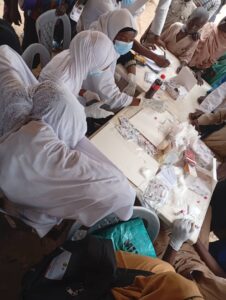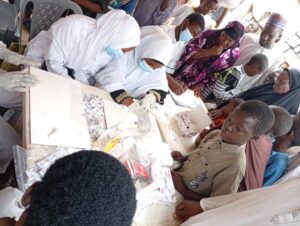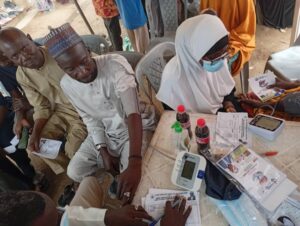By Sani Adamu Musa
In a landmark effort to combat the spread of Hepatitis B in underserved areas, Albarka Comprehensive Medicals, in collaboration with renowned public health advocate Dr. Bala Maijama’a Wunti, conducted a free Hepatitis B screening on July 28, 2025, in Bauchi State.

The outreach, which coincided with World Hepatitis Day, drew hundreds of residents from Wunti and Gwallaga Ta Gabbas wards, highlighting a growing public interest in preventive healthcare.
Dr. Isah Adamu, the Director of Albarka Comprehensive Medicals, emphasized the urgency of early detection in fighting the disease. “Hepatitis B is a silent killer that often goes unnoticed until it’s too late. Early diagnosis gives people a fighting chance,” he said. “We launched this initiative to bridge the gap in access to quality healthcare, especially in communities that are often forgotten.”
 Dr. Adamu, whose facility has been at the forefront of community health interventions in the state, noted that the screening was only one part of a broader strategy. “We also provided counseling and education to help people understand the risks, transmission, and prevention of Hepatitis B. Many participants left not only with test results but with knowledge that could save their lives or the lives of their loved ones.”
Dr. Adamu, whose facility has been at the forefront of community health interventions in the state, noted that the screening was only one part of a broader strategy. “We also provided counseling and education to help people understand the risks, transmission, and prevention of Hepatitis B. Many participants left not only with test results but with knowledge that could save their lives or the lives of their loved ones.”
He added that Albarka Comprehensive Medicals would continue to prioritize outreach programs that target vulnerable populations. “Healthcare must go beyond hospital walls. It must reach the streets, homes, and marketplaces. That’s where people are, and that’s where we must be if we want to make real impact.”
Dr. Adamu also praised the role of collaboration. “Partnering with people like Dr. Bala Maijama’a Wunti is key. His commitment to public health aligns with our mission. Together, we can replicate this initiative in more communities across Bauchi and beyond.”
“This is not a one-off exercise. We are building a sustainable model. We’re planning follow-up care, vaccination drives, and continuous community engagement. The vision is long-term – to eliminate Hepatitis B as a public health threat.”
Community leaders in the participating wards expressed gratitude for the lifesaving intervention. Malam Sani Shehu Wunti, the ward head of Wunti, described the program as “a turning point in the community’s health journey.” He said, “For many years, our people lacked access to basic health services. This screening has not only brought care closer to them but also educated them about a disease many never knew existed.”
Alhaji Musa Jibrin of Gwallaga Ta Gabbas echoed the sentiment, calling on the government and other health stakeholders to replicate the model. “This initiative is a blessing. We thank Albarka and Dr. Bala for thinking of us. Our youths, women, and elderly now understand the value of knowing their health status. It’s time for more partners to step in.”
Several beneficiaries of the screening shared their relief and gratitude. Aisha Mohammed, a 32-year-old mother of four, said she had never been tested before. “I came here because I heard about the free screening. I was scared at first, but now I’m happy I know my status. I will advise my husband to get tested too.”
Similarly, Anas Shehu a commercial tricycle rider, expressed joy at the care he received. “I didn’t have money to go to the hospital before. Today I was tested, and I got advice from the doctors. I feel cared for. This program should continue.”
Fatima Abdulrahman, a university student, said the educational session was eye-opening. “I used to think Hepatitis B was like malaria. Now I understand how dangerous it is and how to protect myself. I will share what I learned with my friends.”
Health workers at the event provided free counseling and referrals for those who tested positive, ensuring no one was left without guidance. Educational materials were distributed to empower residents with accurate information, while plans for follow-up vaccination drives were announced.
 With rising health concerns in Nigeria’s rural areas, the outreach served as a powerful example of how grassroots healthcare interventions can transform lives. Stakeholders now hope that this model will inspire similar initiatives nationwide, making preventive healthcare a right rather than a privilege.
With rising health concerns in Nigeria’s rural areas, the outreach served as a powerful example of how grassroots healthcare interventions can transform lives. Stakeholders now hope that this model will inspire similar initiatives nationwide, making preventive healthcare a right rather than a privilege.























